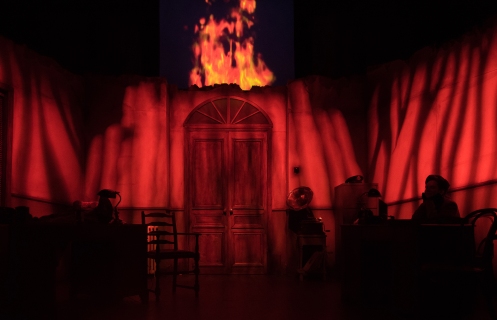Taking Sides
Battling With Ideologies and Decisions
Taking Sides
By Ronald Harwood
The Questors at The Studio, Ealing, until 3rd March
Review by Viola Selby
From a young age we are taught about the horrors of World War II. We are taught about the monstrous Nazis and the heroic British and Americans, clearly defining the good and the bad. Yet one thing that is rarely looked into is that of the courageous deeds of certain Germans who did what they could to save those under persecution.

Wilhelm Furtwängler is an excellent example of one of these unsung heroes. Using his reputation as one of the greatest conductors of his time, Furtwängler helped many of the Jews in Berlin escape to safer territories. However, once the war was over, those considered to have been part of the Nazi party were questioned, tried in court and, if found guilty, often executed. Due to his decision to stay in Berlin throughout the war, Furtwängler was one of those accused and brought in for questioning. It is through Taking Sides, cleverly written by Ronald Harwood and excellently directed by Stephanie Pemberton, that the essence of humanity in such a time of manipulation and uncertainty is explored in a way that encapsulates the audience, taking them back in time to the events of April and mid-July 1946 in Major Arnold’s Office.
At the beginning, the audience are plunged into darkness with only the light from a projector above the stage, showing clips of Furtwängler conducting whilst other images of events from the war are being shown. At the same time the room is filled with the melodic sounds of one of Furtwängler’s pieces. This really does help to set the atmosphere, as well as help the audience to understand a little bit more about who this man was. This same simplistic yet effective approach is used throughout the play, thanks to the creative genius of both Pemberton and stage designer Carla Evans. With the use of only one set design, Major Arnold’s Office, and six characters, the feeling of intensity and claustrophobia are palpable as all of the audience’s attention is focused on the events within the office and Major Arnold’s growing frustration as he tries to gather evidence against this popular conductor.

As well as through the script, character development has also cleverly been explored and depicted by the actors themselves. Adam Kimmel in particular, who plays Major Steve Arnold, manages to convey a man who one may perceive as being a bully, revelling in manipulation and interrogation. But whom, as the play progresses, actually shows a more relatable side, of a deeply vulnerable and hurt individual who has seen sights no one should ever see; sights and smells which have clearly affected him so much so that his life’s purpose has become all about revenge on anyone who did not do all they could to stop this monstrousness. This slow revelation is one of many great twists in the play and is also greatly helped by the exceptional responses and interactions of the other characters. For example, the way Lt. David Wills, performed by Zac Karaman, who perfectly effects the American accent throughout the play, becomes more unsettled and angry by the way Arnold treats Furtwängler. This tension greatly highlights the fact that there is a lot more going on beneath the surface and more than just one motive in this case. Whilst other characters such as Helmuth Rodes, perfectly portrayed by Russell Fleet, manages to keep audience members on their toes by first portraying himself as good man who hated the Nazis throughout the war and who idolised Furtwängler, to suddenly revealing his true easily-corruptible character, whose deepest secret maybe a little darker than just stealing the conductor’s baton. Even Furtwängler himself is not left out of this character revelation.
Through Arnold’s constant interrogating, mixed in with the praise and pity he gets from Lt. Wills and secretary Emmi Stroube, played by the exceptional Evelina Plonyte, and the evidence provided by Tamara Sachs, excellently acted out by Rosie louden, Furtwängler’s real motives for staying in Berlin are given a much more complex conclusion, riddled with self-survival, jealousy, and political games. Simon Taylor does an exceptional job in not only portraying a man battling with his ideologies and past decisions, but also in keeping the audience guessing as to whether Furtwängler was a hero or a villain. For an entertaining yet intense evening of intrigue, guessing and revelation, this show is not one to miss. The only question now is, which side do you take?
Viola Selby
February 2018





Trackbacks & Pingbacks